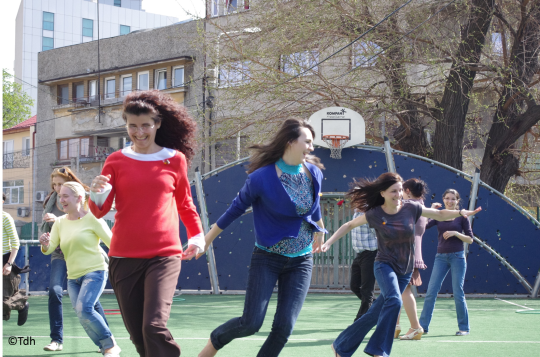Children on the move* go across borders – be it administrative, within the same country, or territorial, within the European Union – in search of a better life. The phenomenon of migration makes them vulnerable and insecure in establishing links, minimizing their chances to develop at their true potential. In addition to this, it is twice as likely that young people and children in situations of migration drop out from school compared to their peers, a fact which only exposes them to social exclusion (see EC report “Prevention of early school dropout in Europe – Lessons learned from “Second chance” educational programs, 2013).
Through its previous projects, Terre des hommes discovered that a good number of children on the move is involved in “Second Chance” programs. However, to prevent their withdrawal, it is recommended to improve the flexibility of learning programs and supplement it with extra-curricular activities taking place in the school (i.e. sport and artistic activities), as UNICEF also recommends it through its report released in 2009 – “Early school dropout: causes and possible ways to prevent it”.
To support this to happen, Tdh developed an inclusive learning methodology that could be further used by teachers working with children on the move in Second Chance programmes.
The methodology was developed within ROBIN, a project implemented at transnational level, in Romania, Austria, Bulgaria, Italy and Spain.- Download the project flyer.
The objectives of the project are:
1. Developing an integrated learning methodology that ensures active learning, coaching and
support based on experiential learning by means of psychosocial activities;
2. Improving the social, technical, personal and methodological competences of adult educators;
3. Equipping educators with tools to enhance their capability to socially integrate children on the
move and develop their global life skills;
4. Building a network of educators from second chance programs to cooperate and exchange
best practices.
Throughout the project, experts from all 5 countries developed the following intellectual outputs (click on language version for download):
1. Research study on the current methodologies used within second chance programmes- EN
2. Needs analysis of educators to better support the social inclusion of children on the move- EN
3. Curriculum of the new learning methodology that addresses the needs of educators- EN
4. The pilot version of the innovative learning methodology based on experiential learning by means of psychosocial activities- EN
5. Final version of the innovative learning methodology based on experiential learning by means of psychosocial activities
6. Robin Handbook.
Partnership:
1. Terre des hommes as Coordinator- Romania
2. Die Berater www.dieberater.com – Austria
3. Know and Can Association www.znamimoga.org- Bulgaria
4. Centro per lo Sviluppo Creativo “Danilo Dolci” (www.danilodolci.org)- Italy
5. INTRAS Foundation www.intras.es – Spain.
For more details about the project, please refer to Raluca Condrut – project manager, raluca.icleanu@archive.tdh.ro.
*By “children on the move” Terre des hommes refers to children and young people with no fixed abode, whose parents are working abroad, who are repatriated, refugees or trafficked, traveling voluntarily or involuntarily, accompanied or alone, within the borders of the same country or within the EU, etc.
______________________________________________________________________________________________________
 „ROBIN – Reinforcing Competences to Build Inclusion through a New learning methodology” project, funded by the European Commission through Erasmus + Programme (KA 2 Strategic Partnerships).
„ROBIN – Reinforcing Competences to Build Inclusion through a New learning methodology” project, funded by the European Commission through Erasmus + Programme (KA 2 Strategic Partnerships).
Ref. no. 2015-1-RO01-KA204-015001
Funding period: November 2015- October 2017
The European Commission support for the production of this publication does not constitute an endorsement of the contents which reflects the views only of the authors, and the Commission cannot be held responsible for any use which may be made of the information contained therein.


